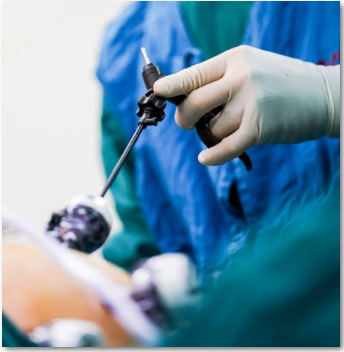Minimally Invasive Surgery:A Benefit for Gastric Cancer Patients
Recently Professor Ding Xuewei and Dr. Li Bin of Gastric Surgery Department has performed a “laparoscopic total gastrectomy with functional jejunal interposition(FJI)digestive tract reconstruction” on a young female patient with gastric cancer and achieved satisfactory result.

Description of the Case
A 33-year-old woman, who had been complaining of intermittent upper abdominal pain for about 2 weeks, was diagnosed with gastric cancer after an initial examination in a local hospital.
She was admitted to our hospital, where Professor Ding Xuewei confirmed the initial diagnosis of gastric cancer after performing the requisite investigations, based on which, Professor Ding suggested surgery as the primary treatment.
Preoperative evaluation indicated that a total gastrectomy might be a feasible option for the patient. However, she expressed significant concern about the large incision in traditional open abdominal surgery, which, she perceived as seriously affecting the physical appearance of her abdomen; she was also worried about the common gastrointestinal reactions after a total gastrectomy, i.e. long-term acid reflux, abdominal distension and indigestion .
In view of the patient’s physical condition and the concerns she had expressed, Professor Ding proposed a “laparoscopic total gastrectomy with functional jejunal interposition(FJI)digestive tract reconstruction” as the modus operandi in place of the original total gastrectomy.
Introduction to the Modus Operandi
“Laparoscopic total gastrectomy” is an operation in which the digestive tract is reconstructed completely by laparoscopy and there are only five laparoscopic holes in the abdomen, which will barely be visible after complete healing, thus achieving a truly minimally invasive effect.
‘Functional jejunal interposition(FJI)’ is a method of digestive tract reconstruction, which can effectively reduce post surgical acid reflux, abdominal distension and indigestion thereby enhancing the patient’s nutritional absorption and improve their general quality of life.

Functional jejunal interposition(FJI)
The operation for the above-mentioned patient was carried out as planned. As a result of the careful and patient work of the surgical team, the operation has been performed successfully and achieved the desired effect. The patient recovered well and as a result, was discharged from hospital 9 days after the operation with no complaints of abdominal distension, acid reflux or indigestion.

The patient is satisfied with both the minimal scars left by the invasive incision and the rapid recovery of digestive tract function. She is now receiving postoperative chemotherapy in our hospital.

Abdominal incision after laparoscopic total gastrectomy
Tips from the Expert
Symptoms of gastric cancer are commonly not very distinctive and likely to be mistaken for other gastric diseases. As a consequence, those patients are hindered from getting timely treatment. Gastric cancer in its early stages often manifests itself in physical discomfort such as abdominal pain, bloating and loss of appetite, which may be misdiagnosed as gastritis or cankerous lesions and be treated as such. However, although the symptoms can be temporarily relieved after such treatment, they will generally recur soon after. Hence, it is highly advisable for people who suffer frequent abdominal pain, abdominal distension and loss of appetite, especially after they have received relevant treatment for gastritis or cankerous lesions, to be on guard against the possibility of having gastric cancer and have a gastroscopy as soon as possible in order to have an accurate diagnosis enabling them to receive the proper treatment.
The success of “laparoscopic total gastrectomy with functional jejunal interposition(FJI)digestive tract reconstruction” has pushed forward the development of minimally invasive surgery technology in Tianjin, and serves as a milestone for Tianjin Medical University Cancer Institute and Hospital within this field all cross China.